高考英语语法一点通课件——Lesson 2 时态
文档属性
| 名称 | 高考英语语法一点通课件——Lesson 2 时态 | 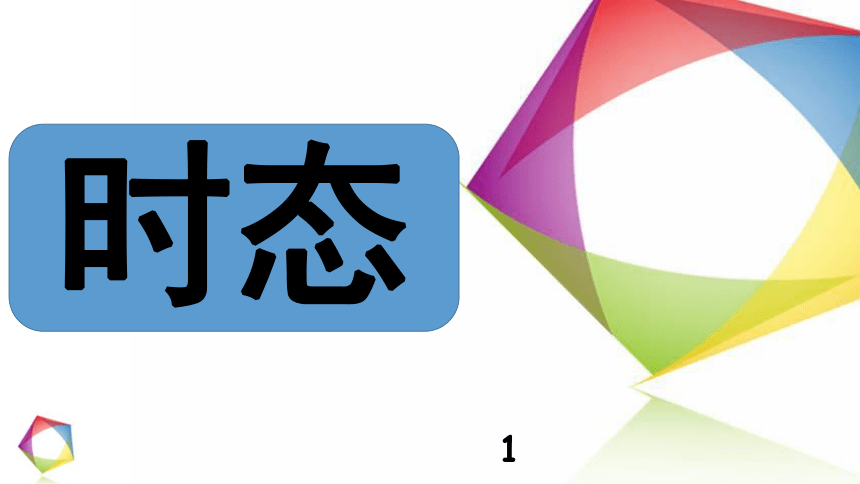 | |
| 格式 | pptx | ||
| 文件大小 | 684.1KB | ||
| 资源类型 | 试卷 | ||
| 版本资源 | 通用版 | ||
| 科目 | 英语 | ||
| 更新时间 | 2022-04-11 14:52:16 | ||
图片预览


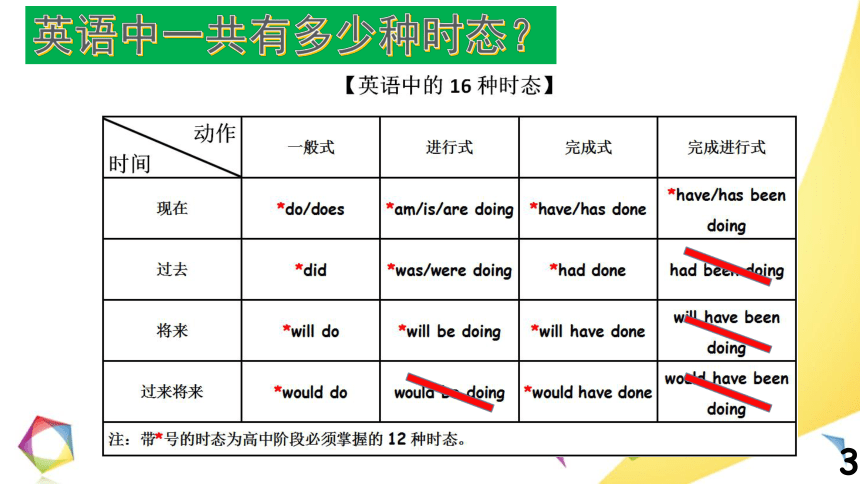
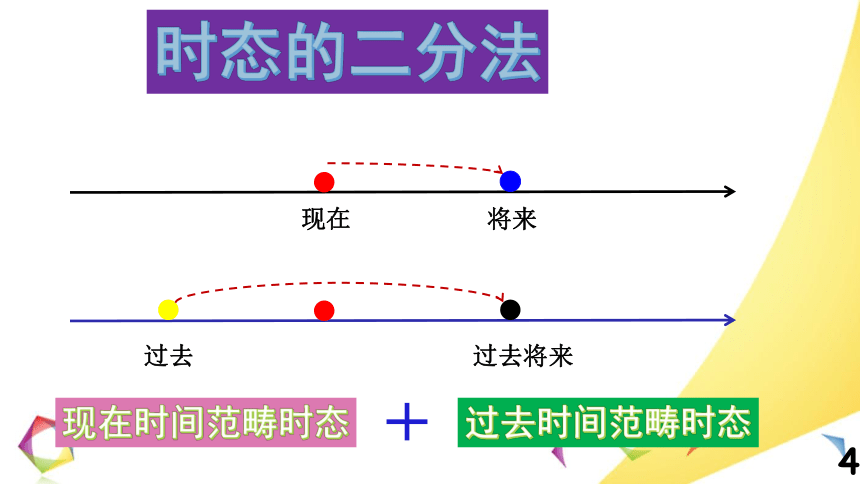
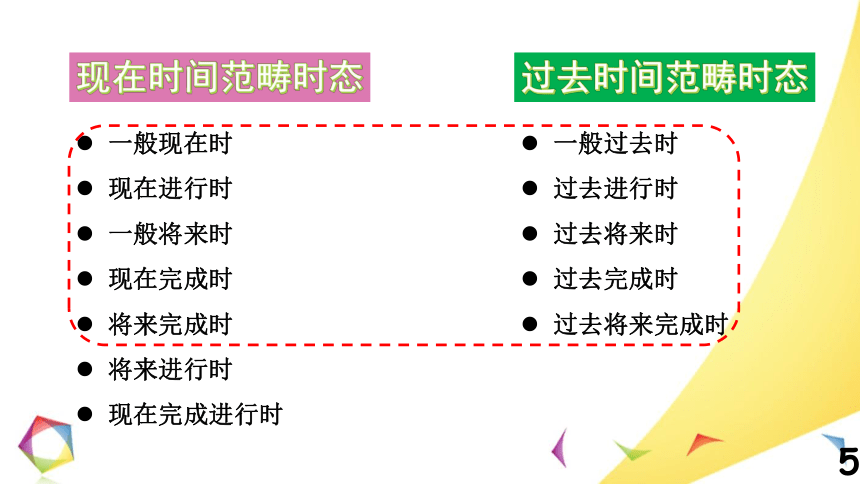
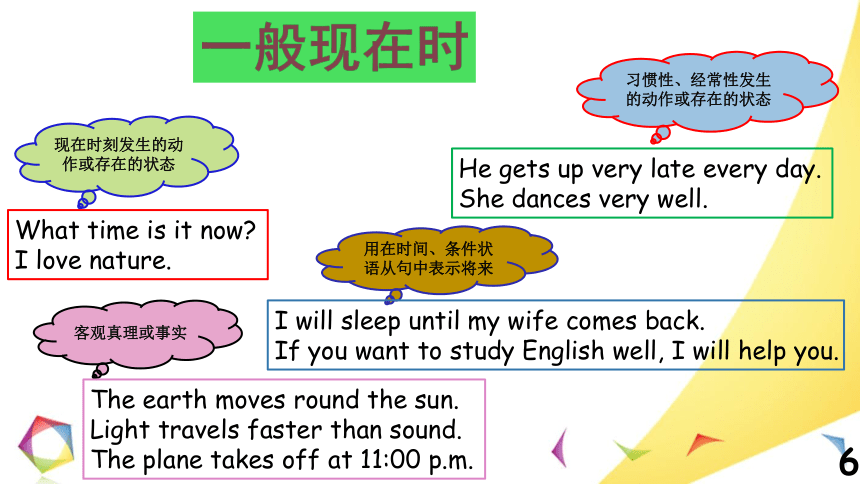
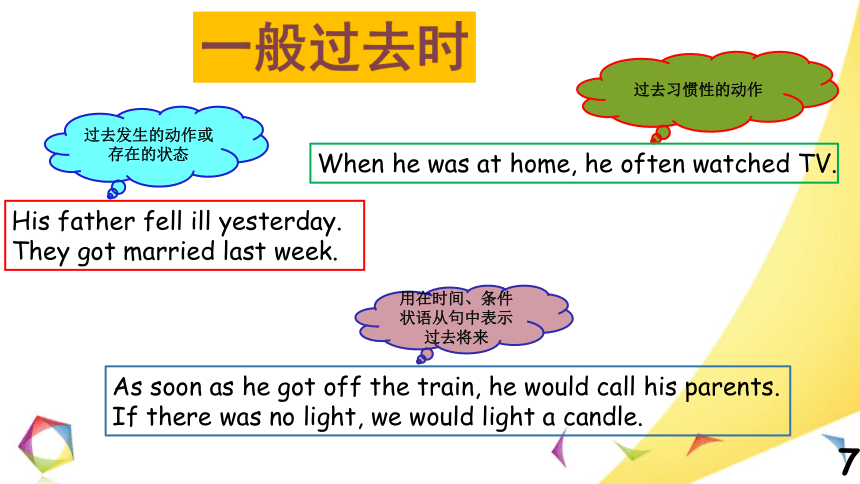
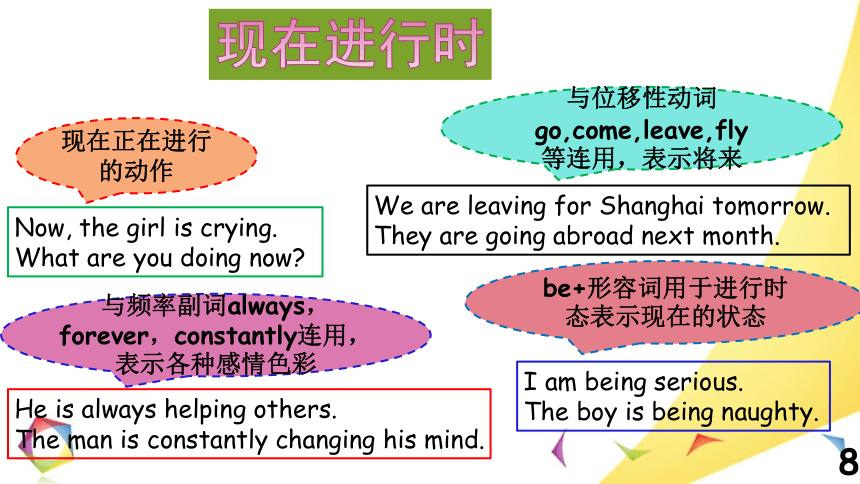
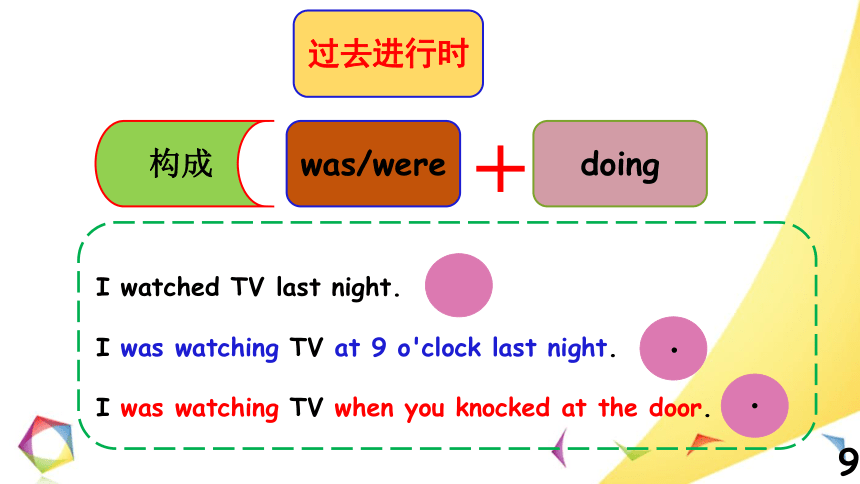
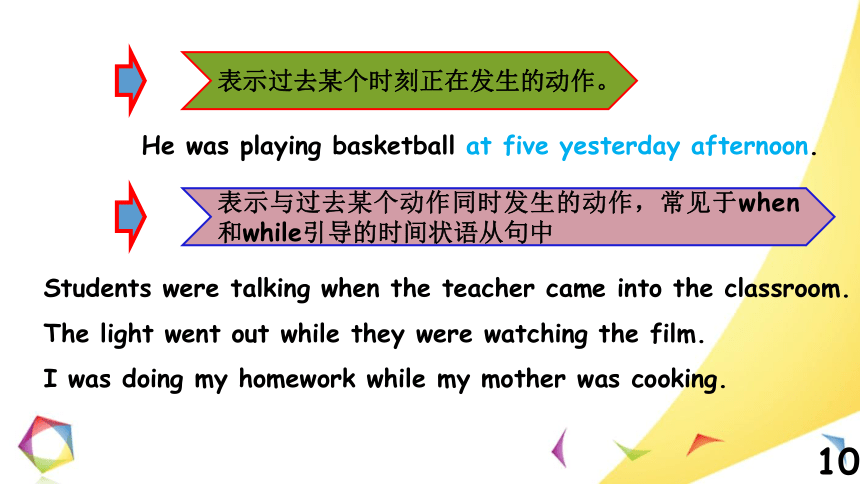
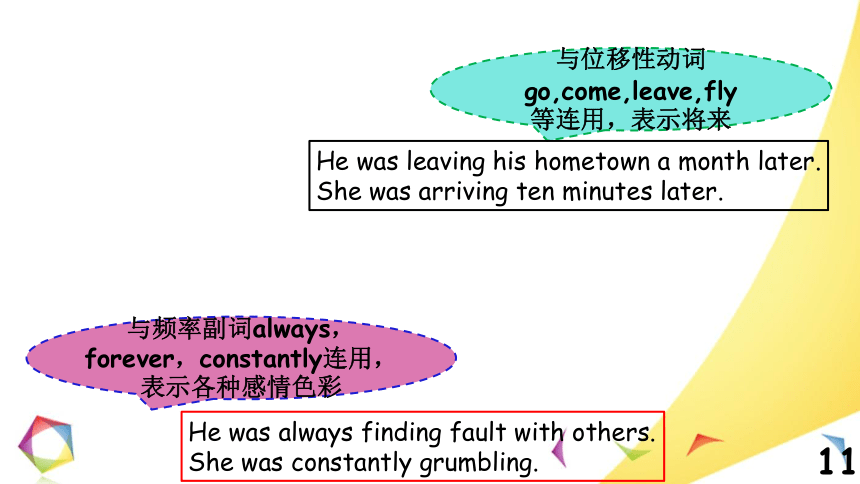
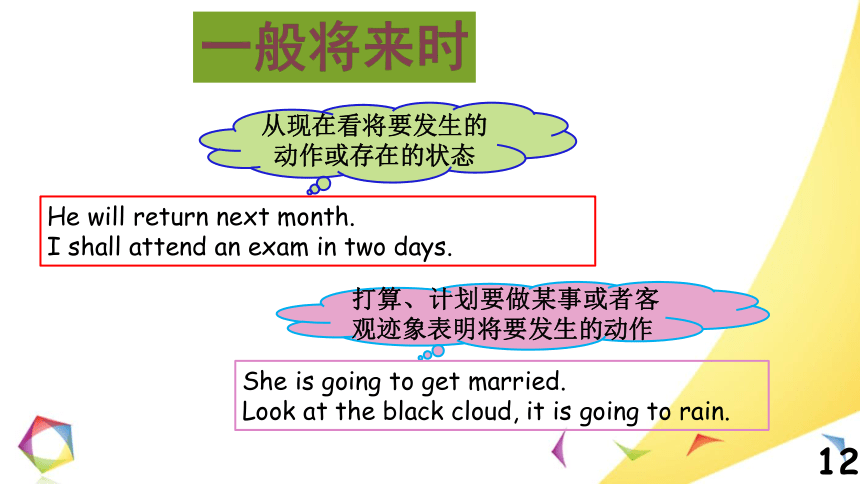
文档简介
(共39张PPT)
时态时态是什么时态时态就是动作发生的时间和动作本身的状态。英语中一共有多少种时态?时态的二分法现在将来过去过去将来现在时间范畴时态过去时间范畴时态现在时间范畴时态过去时间范畴时态一般现在时现在进行时一般将来时现在完成时将来完成时将来进行时现在完成进行时一般过去时过去进行时过去将来时过去完成时过去将来完成时一般现在时现在时刻发生的动作或存在的状态What time is it now I love nature.习惯性、经常性发生的动作或存在的状态He gets up very late every day.She dances very well.客观真理或事实The earth moves round the sun.Light travels faster than sound.The plane takes off at 11:00 p.m.用在时间、条件状语从句中表示将来I will sleep until my wife comes back.If you want to study English well, I will help you.一般过去时过去发生的动作或存在的状态His father fell ill yesterday.They got married last week.过去习惯性的动作When he was at home, he often watched TV.用在时间、条件状语从句中表示过去将来As soon as he got off the train, he would call his parents.If there was no light, we would light a candle.现在进行时现在正在进行的动作Now, the girl is crying.What are you doing now 与频率副词always,forever,constantly连用,表示各种感彩He is always helping others.The man is constantly changing his mind.与位移性动词go,come,leave,fly等连用,表示将来We are leaving for Shanghai tomorrow.They are going abroad next month.be+形容词用于进行时态表示现在的状态I am being serious.The boy is being naughty.过去进行时I watched TV last night.Iwas watchingTVat 9 o'clock last night.Iwas watchingTVwhen you knocked at the door.构成was/weredoing表示过去某个时刻正在发生的动作。He was playing basketballat five yesterday afternoon.表示与过去某个动作同时发生的动作,常见于when和while引导的时间状语从句中Students were talking when the teacher came into the classroom.The light went out while they were watching the film.I was doing my homework while my mother was cooking.与频率副词always,forever,constantly连用,表示各种感彩He was always finding fault with others.She was constantly grumbling.与位移性动词go,come,leave,fly等连用,表示将来He was leaving his hometown a month later.She was arriving ten minutes later.一般将来时从现在看将要发生的动作或存在的状态He will return next month.I shall attend an exam in two days.打算、计划要做某事或者客观迹象表明将要发生的动作She is going to get married.Look at the black cloud, it is going to rain.will/shall+dobe going to+doVS表示说话人的愿望或想法表示必然性,注定要发生的事情没有经过事前考虑的意图表示打算、计划将要做的事情客观迹象表明将要发生的事情事前考虑过的意图I think China will become stronger and stronger.Fish will die out of water.Our school is going to hold the sports meeting next week.Her face becomes red. She is going to get better.—Why do you put off all the pictures —I am going to repaint the wall.—The box is too heavy to carry.—Oh, I will help you.一般将来时的特殊表达法位移性动词常用进行时态表示将来,如:go、come、arrive、leave、start、stay、die、return等。I'm leaving tomorrow.The plane is taking off at six.be+不定式,这种结构表示计划、安排或征求意见,或者命令。The store is to be closed at 10:00 p.m.Are you to go out with us be about+不定式,表示即将发生的动作。The film is about to begin.He is about to leave home when the telephone rings.on the point of表示即将要发生的事情He is on the point of becoming a college student.过去将来时Tomsaysthat hewill go toBeijing tomorrow.Tomsaidthat hewould go toBeijing tomorrow.构成woulddowas/weregoing to do从过去看将要发生的动作或存在的状态I knew you would say that.I hoped that they would make up someday.过去习惯性的动作He would take a walk in the park every Sunday.表示一个动作发生在过去,到现在已经完成了,并对现在造成了一定影响。过去现在---Would you like some bread ---No, thanks. I have had my breakfast.(对现在的影响:不饿)表示一个动作从过去某个时间点开始,延续到现在,并可能继续延续下去(谓语动词要用延续性动词)。过去现在She has worked here for over twenty years.现在完成时时间状语与副词already和yet连用。already一般用于肯定句中,yet一般用于否定句和疑问句中。We have already finished our homework.They haven't finished their homework yet.与ever “曾经”和never“从未”连用。它们多用于否定或疑问句中。Have you ever been to the Great Wall I have never been toBeijing.与表示到说话为止的过去时间状语连用,如just(刚才), before(之前), up to now(到目前为止), so far(到现在为止), until now(直到现在),in the past/last few years(在过去的几年里)等I have seen her before, but I can not remember where.He has been there three times in the last few days.与“for+一段时间”,“since+时间点连用。for two dayssince two days ago“for+一段时间”和“since+时间点”后面必须接延续性动词。常见的短暂性动词转换为延续性动词arrive→bein/atbegin(start)→be on die→be deadcome back→be back leave→be awayopen→be openclose→be closedborrow→keepbuy→havefall ill(asleep)→be ill(asleep)join→be in或 be a member ofcatch a cold→have a coldHe has had the computer for three years.His father has been dead for two years.The film has been on for ten minutes.since与现在完成时连用的常用结构现在完成时+since+时间点现在完成时+since+一般过去时It is/has been+时间段+since+一般过去时“自从……已经多长时间了”The boy has slept since 8 o'clock.He has worked in this company since he came to Beijing.It is/has been ten years since they got married.“It (this, that) is (will be) the first (second, third, last) time that+从句”结构中的从句要用现在完成时。It is the first time that I have sung on the stage.This will be the second time that he has won the first prize.It (this) is +the+形容词最高级+名词+that…”结构中的从句要用现在完成时。It is the best film that I have seen.This is the most famous book that he has written.have been to表示“曾经去过某地”,现在已经不在那里了。have gone(to)表示“ 到某地去了”,表示到了某地或正在去某地的途中,说话时该人不在现场。have been in 表示“在某地已经多长时间了。过去现在现在完成时过去完成时现在过去过去的过去过去完成时表示在过去之前已经完成的动作,即“过去的过去”。过去完成时过去完成时表示一个动作或状态在过去某一动作之前已经完成或结束。HebeforeI .She me that she a new novel.had leftarrivedtoldhad written现在过去过去的过去现在过去过去的过去过去完成时表示在过去某时之前已经开始,一直延续到这一过去时间。By , my fatherherefor twoyears.By , he eleven hours.the end of last yearten o'clock last nighthadlivedhad workedI have had dinner.I had had dinner.I had had dinnerbefore I went for a walk.I had had dinnerbefore 8 o'clock last night.×过去完成时是一个相对的时态,表示的是“过去的过去”,只有和过去某一时间或某一动作相比较,并且发生在其之前时才能使用。过去完成时用于其它结构中...过去完成时常用在hardly/scarcely/barely……when、no sooner…than等结构中,表示“刚刚…就…,一…就…”。Hardly (scarcely) had they left home when it began to rain.No sooner had they left home than it began to rain.动词think、expect、suppose、plan、hope、mean、intend等的过去完成时可用来表示本打算做而没有做的事,表达某种惋惜之情。think、hope、expect、want等词的过去完成时常用于比较结构中。We had planned to go on a picnic, but it rained.I had meant to pick you up, but my car was broken today.The plan worked out better than we had expected.Things went more smoothly than we had hoped.“It (this, that) + was + first (second, third, last)或形容词最高级+ that…”结构,从句同过去完成时连用。It was the second time that he had gone abroad.This was the first time that I had spoken to a foreigner.It was the most moving film that I had seen.That was the most exciting footballgamethat I had watched.将来完成时表示在将来某一时间之前或某动作之前已经完成的动作。We shall have completed the project by the end of this year.Beforewe arrive at the station, the train will have left.表示对现在或将来可能已经完成动作的推测。My uncle will have left by now.It is already eleven o'clock, he will have slept.现在将来表示从过去某个时间看将来某时之前已经完成的动作。He said he would have had dinner before his son came back.I thought that he would have graduatedby the end of the next month..用在if引导的条件虚拟语气中,表示对过去情况的虚拟。If you had taken the medicine on time, you would have get better.过去将来过去将来完成时现在完成进行时现在完成进行时表示动作从过去某一时间开始一直延续到现在,还要延续下去,并常和all day、all this time、this week、this month、all night、all the morning、recently以及since和for等连用。He has been looking for his English book all the morning.He is ill. He has been lying in the bed for three weeks.表示动作的重复(指断断续续,而非一直不停)。You have been saying that for five years.He has been taking part in many football games in this season.过去现在将来进行式表示将来某一时刻正在进行或持续的动作。I will be attending the meeting at six this afternoon.What will you be doing this time tomorrow 表示某种可能或推测,表示“我料想,我估计”含义。You teacher will be telling you about this.He won't be wanting these old books.Flowers will be coming out soon.数轴上的时态过去现在将来过去的过去过去过去将来一般现在时现在进行时现在完成时一般将来时一般过去时过去进行时过去完成时过去将来时将来进行时将来完成时现在完成进行时过去将来完成时现在时间范畴时态过去时间范畴时态一般现在时现在进行时一般将来时现在完成时将来完成时将来进行时现在完成进行时一般过去时过去进行时过去将来时过去完成时过去将来完成时时态一致原则时态一致也叫时态呼应,复合句中某些从句(特别是宾语从句)中的谓语动词的时态,常常受到主句谓语中动词时态的影响和制约,这种现象称为时态一致。如果主句中谓语动词的时态是现在时或将来时,从句可以根据需要选用任意时态。I know that he joined in the army many years ago.如果主句中谓语动词的时态是一般过去时,则从句要用与过去时间范畴时态。I thought that he played football well.(同时发生)I thought that he was playing football.(同时发生且正在进行)I thought that he had began to play football before you came.(之前发生)I thought that he would play football with us tomorrow.(之后发生)如果从句表示的是客观事实、真理时,从句通常用一般现在时,不受主句时态的影响。The teacher told the children the moon moves around the sun.沙场大点兵1. The manager is said to have arrived back from Paris where he ____some European business partners. A. would meet B. is meeting C. meetsD. had met2. —Could I use your car tomorrow morning —Sure. I ______ a report at home.A.will be writing B. will have writtenC. have written D. have been writing3.—How much do you know about the Youth Olympic Games to be held in Nanjing —Well, the media ______it in a variety of forms.A.cover B. will coverC. have covered D. covered4. The real reason why prices____, and still are, too high is complex, and no short discussion can satisfactorily explain this problem.A. were B. will beC. have been D. had been5.Dashan, who___cross talk, the Chinese comedic tradition, for decades, wants to mix it up with the Western stand-up tradition.A.will be learning B. is learningC. had been learning D. has been learning
时态时态是什么时态时态就是动作发生的时间和动作本身的状态。英语中一共有多少种时态?时态的二分法现在将来过去过去将来现在时间范畴时态过去时间范畴时态现在时间范畴时态过去时间范畴时态一般现在时现在进行时一般将来时现在完成时将来完成时将来进行时现在完成进行时一般过去时过去进行时过去将来时过去完成时过去将来完成时一般现在时现在时刻发生的动作或存在的状态What time is it now I love nature.习惯性、经常性发生的动作或存在的状态He gets up very late every day.She dances very well.客观真理或事实The earth moves round the sun.Light travels faster than sound.The plane takes off at 11:00 p.m.用在时间、条件状语从句中表示将来I will sleep until my wife comes back.If you want to study English well, I will help you.一般过去时过去发生的动作或存在的状态His father fell ill yesterday.They got married last week.过去习惯性的动作When he was at home, he often watched TV.用在时间、条件状语从句中表示过去将来As soon as he got off the train, he would call his parents.If there was no light, we would light a candle.现在进行时现在正在进行的动作Now, the girl is crying.What are you doing now 与频率副词always,forever,constantly连用,表示各种感彩He is always helping others.The man is constantly changing his mind.与位移性动词go,come,leave,fly等连用,表示将来We are leaving for Shanghai tomorrow.They are going abroad next month.be+形容词用于进行时态表示现在的状态I am being serious.The boy is being naughty.过去进行时I watched TV last night.Iwas watchingTVat 9 o'clock last night.Iwas watchingTVwhen you knocked at the door.构成was/weredoing表示过去某个时刻正在发生的动作。He was playing basketballat five yesterday afternoon.表示与过去某个动作同时发生的动作,常见于when和while引导的时间状语从句中Students were talking when the teacher came into the classroom.The light went out while they were watching the film.I was doing my homework while my mother was cooking.与频率副词always,forever,constantly连用,表示各种感彩He was always finding fault with others.She was constantly grumbling.与位移性动词go,come,leave,fly等连用,表示将来He was leaving his hometown a month later.She was arriving ten minutes later.一般将来时从现在看将要发生的动作或存在的状态He will return next month.I shall attend an exam in two days.打算、计划要做某事或者客观迹象表明将要发生的动作She is going to get married.Look at the black cloud, it is going to rain.will/shall+dobe going to+doVS表示说话人的愿望或想法表示必然性,注定要发生的事情没有经过事前考虑的意图表示打算、计划将要做的事情客观迹象表明将要发生的事情事前考虑过的意图I think China will become stronger and stronger.Fish will die out of water.Our school is going to hold the sports meeting next week.Her face becomes red. She is going to get better.—Why do you put off all the pictures —I am going to repaint the wall.—The box is too heavy to carry.—Oh, I will help you.一般将来时的特殊表达法位移性动词常用进行时态表示将来,如:go、come、arrive、leave、start、stay、die、return等。I'm leaving tomorrow.The plane is taking off at six.be+不定式,这种结构表示计划、安排或征求意见,或者命令。The store is to be closed at 10:00 p.m.Are you to go out with us be about+不定式,表示即将发生的动作。The film is about to begin.He is about to leave home when the telephone rings.on the point of表示即将要发生的事情He is on the point of becoming a college student.过去将来时Tomsaysthat hewill go toBeijing tomorrow.Tomsaidthat hewould go toBeijing tomorrow.构成woulddowas/weregoing to do从过去看将要发生的动作或存在的状态I knew you would say that.I hoped that they would make up someday.过去习惯性的动作He would take a walk in the park every Sunday.表示一个动作发生在过去,到现在已经完成了,并对现在造成了一定影响。过去现在---Would you like some bread ---No, thanks. I have had my breakfast.(对现在的影响:不饿)表示一个动作从过去某个时间点开始,延续到现在,并可能继续延续下去(谓语动词要用延续性动词)。过去现在She has worked here for over twenty years.现在完成时时间状语与副词already和yet连用。already一般用于肯定句中,yet一般用于否定句和疑问句中。We have already finished our homework.They haven't finished their homework yet.与ever “曾经”和never“从未”连用。它们多用于否定或疑问句中。Have you ever been to the Great Wall I have never been toBeijing.与表示到说话为止的过去时间状语连用,如just(刚才), before(之前), up to now(到目前为止), so far(到现在为止), until now(直到现在),in the past/last few years(在过去的几年里)等I have seen her before, but I can not remember where.He has been there three times in the last few days.与“for+一段时间”,“since+时间点连用。for two dayssince two days ago“for+一段时间”和“since+时间点”后面必须接延续性动词。常见的短暂性动词转换为延续性动词arrive→bein/atbegin(start)→be on die→be deadcome back→be back leave→be awayopen→be openclose→be closedborrow→keepbuy→havefall ill(asleep)→be ill(asleep)join→be in或 be a member ofcatch a cold→have a coldHe has had the computer for three years.His father has been dead for two years.The film has been on for ten minutes.since与现在完成时连用的常用结构现在完成时+since+时间点现在完成时+since+一般过去时It is/has been+时间段+since+一般过去时“自从……已经多长时间了”The boy has slept since 8 o'clock.He has worked in this company since he came to Beijing.It is/has been ten years since they got married.“It (this, that) is (will be) the first (second, third, last) time that+从句”结构中的从句要用现在完成时。It is the first time that I have sung on the stage.This will be the second time that he has won the first prize.It (this) is +the+形容词最高级+名词+that…”结构中的从句要用现在完成时。It is the best film that I have seen.This is the most famous book that he has written.have been to表示“曾经去过某地”,现在已经不在那里了。have gone(to)表示“ 到某地去了”,表示到了某地或正在去某地的途中,说话时该人不在现场。have been in 表示“在某地已经多长时间了。过去现在现在完成时过去完成时现在过去过去的过去过去完成时表示在过去之前已经完成的动作,即“过去的过去”。过去完成时过去完成时表示一个动作或状态在过去某一动作之前已经完成或结束。HebeforeI .She me that she a new novel.had leftarrivedtoldhad written现在过去过去的过去现在过去过去的过去过去完成时表示在过去某时之前已经开始,一直延续到这一过去时间。By , my fatherherefor twoyears.By , he eleven hours.the end of last yearten o'clock last nighthadlivedhad workedI have had dinner.I had had dinner.I had had dinnerbefore I went for a walk.I had had dinnerbefore 8 o'clock last night.×过去完成时是一个相对的时态,表示的是“过去的过去”,只有和过去某一时间或某一动作相比较,并且发生在其之前时才能使用。过去完成时用于其它结构中...过去完成时常用在hardly/scarcely/barely……when、no sooner…than等结构中,表示“刚刚…就…,一…就…”。Hardly (scarcely) had they left home when it began to rain.No sooner had they left home than it began to rain.动词think、expect、suppose、plan、hope、mean、intend等的过去完成时可用来表示本打算做而没有做的事,表达某种惋惜之情。think、hope、expect、want等词的过去完成时常用于比较结构中。We had planned to go on a picnic, but it rained.I had meant to pick you up, but my car was broken today.The plan worked out better than we had expected.Things went more smoothly than we had hoped.“It (this, that) + was + first (second, third, last)或形容词最高级+ that…”结构,从句同过去完成时连用。It was the second time that he had gone abroad.This was the first time that I had spoken to a foreigner.It was the most moving film that I had seen.That was the most exciting footballgamethat I had watched.将来完成时表示在将来某一时间之前或某动作之前已经完成的动作。We shall have completed the project by the end of this year.Beforewe arrive at the station, the train will have left.表示对现在或将来可能已经完成动作的推测。My uncle will have left by now.It is already eleven o'clock, he will have slept.现在将来表示从过去某个时间看将来某时之前已经完成的动作。He said he would have had dinner before his son came back.I thought that he would have graduatedby the end of the next month..用在if引导的条件虚拟语气中,表示对过去情况的虚拟。If you had taken the medicine on time, you would have get better.过去将来过去将来完成时现在完成进行时现在完成进行时表示动作从过去某一时间开始一直延续到现在,还要延续下去,并常和all day、all this time、this week、this month、all night、all the morning、recently以及since和for等连用。He has been looking for his English book all the morning.He is ill. He has been lying in the bed for three weeks.表示动作的重复(指断断续续,而非一直不停)。You have been saying that for five years.He has been taking part in many football games in this season.过去现在将来进行式表示将来某一时刻正在进行或持续的动作。I will be attending the meeting at six this afternoon.What will you be doing this time tomorrow 表示某种可能或推测,表示“我料想,我估计”含义。You teacher will be telling you about this.He won't be wanting these old books.Flowers will be coming out soon.数轴上的时态过去现在将来过去的过去过去过去将来一般现在时现在进行时现在完成时一般将来时一般过去时过去进行时过去完成时过去将来时将来进行时将来完成时现在完成进行时过去将来完成时现在时间范畴时态过去时间范畴时态一般现在时现在进行时一般将来时现在完成时将来完成时将来进行时现在完成进行时一般过去时过去进行时过去将来时过去完成时过去将来完成时时态一致原则时态一致也叫时态呼应,复合句中某些从句(特别是宾语从句)中的谓语动词的时态,常常受到主句谓语中动词时态的影响和制约,这种现象称为时态一致。如果主句中谓语动词的时态是现在时或将来时,从句可以根据需要选用任意时态。I know that he joined in the army many years ago.如果主句中谓语动词的时态是一般过去时,则从句要用与过去时间范畴时态。I thought that he played football well.(同时发生)I thought that he was playing football.(同时发生且正在进行)I thought that he had began to play football before you came.(之前发生)I thought that he would play football with us tomorrow.(之后发生)如果从句表示的是客观事实、真理时,从句通常用一般现在时,不受主句时态的影响。The teacher told the children the moon moves around the sun.沙场大点兵1. The manager is said to have arrived back from Paris where he ____some European business partners. A. would meet B. is meeting C. meetsD. had met2. —Could I use your car tomorrow morning —Sure. I ______ a report at home.A.will be writing B. will have writtenC. have written D. have been writing3.—How much do you know about the Youth Olympic Games to be held in Nanjing —Well, the media ______it in a variety of forms.A.cover B. will coverC. have covered D. covered4. The real reason why prices____, and still are, too high is complex, and no short discussion can satisfactorily explain this problem.A. were B. will beC. have been D. had been5.Dashan, who___cross talk, the Chinese comedic tradition, for decades, wants to mix it up with the Western stand-up tradition.A.will be learning B. is learningC. had been learning D. has been learning
